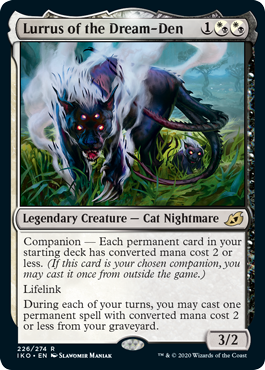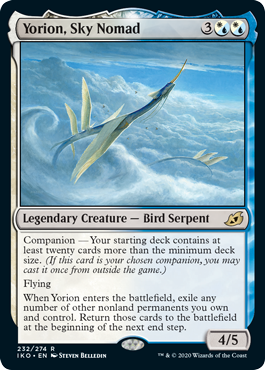The companion mechanic has been the talk of the Magic: The Gathering community for the last several months. It’s a mechanic that stretches the rules of Magic, and it’s so powerful that it resulted in a major ban decision a mere hour after it was announced.
But if you’re brand-new to Magic, like many readers of this column, your main concern is how the companion mechanic even works. Let’s break it down first before getting into the nitty-gritty of card bans and rules changes.
What is Companion?
The companion mechanic first appeared in Ikoria: Lair of Behemoths, an expansion set on a rugged plane full of fearsome beasts. But not all beasts on Ikoria are deadly – some want to be your friends! These “companion” creatures are there for you through thick and thin, whenever you need their help.
If you choose a creature to be your companion, they start the game in your sideboard instead of your main deck. At any point in the game, you may pay three mana of any color to move your companion from your sideboard into your hand. Then, you can cast them from your hand like you would cast any other card. See? Always there when you need ’em!
Summoning a creature from your sideboard at will can provide huge advantages in a game of Magic. To level the playing field a bit, companion cards each come with deck-building restrictions that limit the types of cards you can include in your deck. For example, if Lurrus is your companion, your deck can only include permanents that cost two mana or less; if you choose Keruga, you can only play nonland cards that cost three mana or more.
Despite these restrictions, companions have found homes in various formats and tested players’ creativity and adaptability. But they’re not nearly as ubiquitous as they were upon Ikoria’s release, thanks for an unprecedented rules change.
The Companion Rules Change

You may notice when you look at a companion card that the rules text doesn’t mention the three generic mana you have to pay to put your companion into your hand. Instead, it says this:
“If this card is your chosen companion, you may cast it once from outside the game.”
This is the original wording and use of the companion mechanic. Companions were designed to be cast once during a game directly from a player’s sideboard, but they eventually proved problematic for tournament play. Some companions – especially those with lighter deck-building requirements – ruled the roost in competitive formats and prompted an unusual response from Wizards of the Coast. Rather than ban companions from the formats they dominated, Wizards changed the mechanic itself to power down these mighty beasts.
So far, their actions have had the desired effect: companions are not nearly as popular now as they were in the days leading up to the rules change. And in the process, Wizards has set a precedent for how they might respond to similar situations in the future.
For new players, the companion rules change serves as a reminder to stay up-to-date with Magic rules, including any card text errata. Fortunately, card-search sites like Scryfall and Gatherer both include notes on each card in their databases. We recommend reading those notes whenever you encounter a new card or are unsure how different cards interact with each other.
Banned Companions

Before Wizards issued the companion rules change, a handful of companions were banned in popular Magic formats. These bans are still in effect despite the rules change, so we wanted to offer you a quick run-down of all the banned companions.
Lurrus of the Dream-Den: Banned in Legacy and Vintage
Lutri, the Spellchaser: Banned in Commander and Brawl
Zirda, the Dawnwaker: Banned in Legacy
Additionally, Yorion, Sky Nomad cannot be your companion in any format with a fixed deck size, including Commander and Brawl. It is still legal in those formats, however.
Learn More!

If you’re like to learn more about companions and their uses in your favorite format, here are a few additional Card Kingdom articles you can check out:
Companion in Commander and Brawl
Should You Still Play Companions in Modern?

